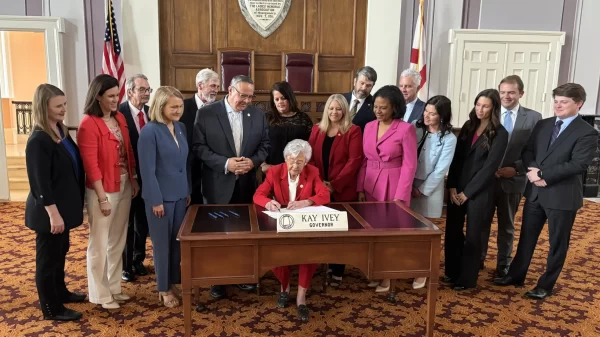By Brandon Moseley
Alabama Political Reporter
On Tuesday, March 18, the Alabama House of Representatives addressed the fiscal year 2015 Education Budget which begins on October 1.
The most controversial aspect of the Education Trust Fund (ETF) budget is that, if the Senate concurs, teacher and education employees will see no pay increase. The Alabama Education Association had been asking for a 5 percent pay increase for teachers and education support personnel before the session. House Democrats were proposing a 4 percent raise.
Alabama Governor Robert Bentley (R) submitted a budget to the legislature with a more modest 2 percent pay increase. The budget that came out of the Alabama Senate, SB 184, sponsored by Senator Trip Pittman, included just a 1 percent pay bonus that might not necessarily extend to the 2016 fiscal year. The House Ways and Means Education Committee replaced the Pittman budget with a substitute that contained no pay raise at all. As expected, that was the budget which passed on the House floor on Tuesday.
House Ways and Means Education Committee Chairman Bill Poole (R) from Tuscaloosa asked that legislators keep the discussion focused on the children and not on politics. “The schools exist to educate children.” Rep. Poole blamed President Obama’s controversial takeover of the nation’s healthcare insurance industry (Obamacare) for the State’s budget woes. Poole called Obamacare and its effects on the Healthcare Industry as “unsustainable” and “out of control.”
Chairman Poole said that the budget does fully repay the Rainy Day Fund as required by law. Second the budget, “Fully adheres to the Proration Prevention Act.” Rep. Poole said that he is very proud that since Republicans began writing the education budget, beginning in fiscal year 2012, that the state has been able to avoid prorating the budget.
Rep. Poole said that fully funding PEEHIP cost the state $48 million. The state is also spending $5.7 million more for new textbooks, funded active shooter training, spent $1.5 million for vocational rehabilitative services, and $1 million to study the benefits of using medication made from cannabidoil to treat children suffering from severe seizures.
Rep. Steve McMillan (R) from Bay Minette said that the state spends $63,000 per teacher unit on salaries and employee benefits and over $80,000 overall. Rep. McMillan said that continuing problems at the Retirements Systems of Alabama (RSA) has eaten up much of the education budget in recent years averaging 20% of the total ETF since 2007. Rep. McMillan said, “Obamacare has handcuffed us.” The state could have funded everything requested without the PEEHIP cost increase due to Obamacare.
House Minority Leader Craig Ford (D) from Gadsden said, “Our educators in Alabama deserve a pay raise.” Ford said that the educators and education retirees could have gotten a raise if the budget had been built around that. Rep. Ford objected to the $one million appropriation to study cannabidoil being included in the ETF budget. Ford said, “We can study weed, but we can’t fund teachers in the classroom. Put that money towards the classroom.”
Representative Mike Ball (R) from Madison said, “Carly’s Law has the ability to save lives. This line item has great potential. Over 60,000 Alabamians suffer from epileptic seizures. Every seizure causes brain damage.”
Rep. Ball said that the types of medication ordinarily prescribed to treat seizures include valium and phenyl-barbituates which have much greater side effects than marijuana and much more than the cannabidoil. Ball said that this research had the potential to help a lot of people, not just children, far beyond Alabama. Ball said that this $1 million was one of the best uses of taxpayer dollars we have ever had and that teachers would benefit if students so afflicted could better perform in the classroom. Ball said that this issue cuts across partisan lines and social lines.
Rep. Poole said that the $1 million appropriation came from the higher education side of the budget and didn’t take anything out of the K-12 budget. Poole said that the state already appropriated money for research and that $1 million came out of those funds.
Rep. Jim McClendon (R) from Springville said, “Mr. Chairman thank you for what you have done here. I am grateful for the appropriation for vocational rehabilitation services.”
Rep. Patricia Todd (D) from Birmingham said that there are a lot of things in the education budget that are not education. Rep. Todd listed the administrative costs for the Department of Veterans Affairs, the State Building Commission, and the Alabama Department of Commerce as non-education appropriations that are included in the ETF because the State’s General Funds is so poorly funded.
Todd also objected to a $250,000 line item appropriation for Talladega College and a $6 million appropriation for Marian Military Institute which Todd says only has 149 students.
Rep. Marcel Black (D) from Tuscumbia questioned if the $48 million in additional appropriations for PEEHIP was sufficient and pointed out that the Governor’s budget had included more to fund PEEHIP.
Chairman Poole said that the state is spending $714 per educator per month to pay for educators healthcare benefits and that this budget would increase that to $753 per educator per month. Poole insisted that the $48 million increase would be sufficient to fully fund PEEHIP.
Alabama Governor Robert Bentley had asked for $72 million in his budget request.
Rep. Jim Patterson (R) from Meridianville said that the cost of giving all the educators and retirees a 6 percent raise would cost the state $873 million. The state is having to appropriate $748 million to RSA. Patterson blamed unfunded liabilities from previous legislatures giving raises to retirees and poor investment performance at RSA for the problems at RSA and for the difficulty the legislature was facing in the budget.
Rep. Terri Collins (R) from Decatur thanked Chairman Poole for his hard work on the budget and thanked him for funding 400 additional middle school teachers, “Where we need them the most.” Collins said that fully funding PEEHIP is where the legislature could do the most good for education employees and retirees.
Despite division among Republicans over the pay raise issue, the Alabama House of Representatives narrowly passed the $5.93 billion education budget by a 51-47 vote.
House Democrats attempted to amend the budget to include the pay raise; but their attempt was rebuffed by the Republican Supermajority.
The House passed the ETF budget without any pay raise. SB 184 now goes back to the Senate for their consideration of the changes that were made by the House.
Governor Bentley has promised to veto the ETF budget without his 2 percent raise for education employees; but no one expects that the Republican-controlled legislature will have any trouble at all overriding the Governor’s veto.
If this version of the budget ultimately becomes law, since Republicans have written the budgets, education employees have gotten just one 2 percent pay increase, retirees have gotten no cost of living adjustments, and general fund employees will get one highly conditional raise if optimistic revenue estimates prove correct.





















































